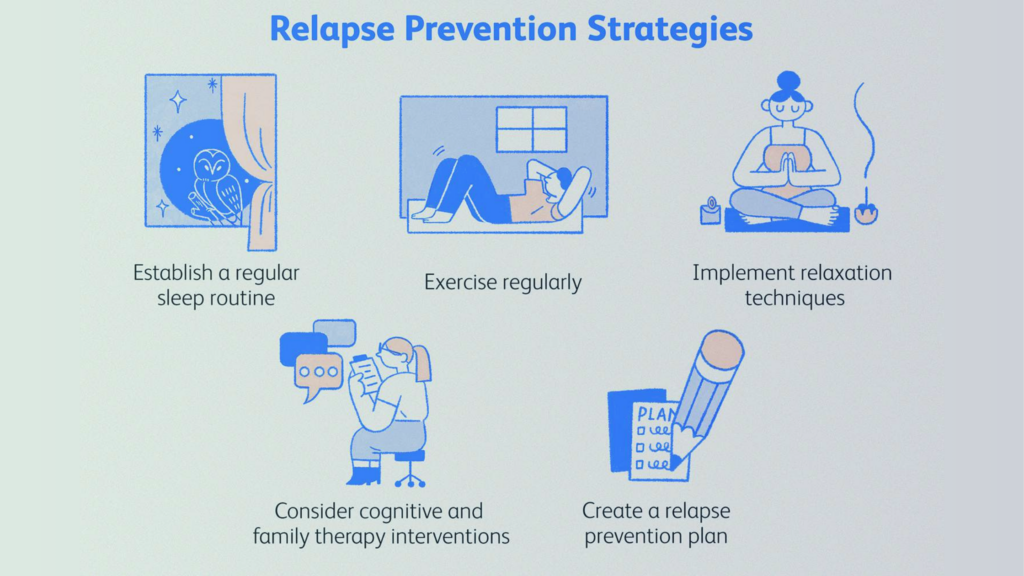Why do addicts relapse when things are good? Many recovering individuals and their loved ones find themselves puzzled by this question, as relapse can occur even in seemingly stable, successful times. Understanding the reasons behind this paradox is crucial for long-term recovery. In this blog, we’ll explore why relapse happens even during the good moments and provide strategies to prevent it, ensuring lasting recovery.
This blog will help you understand why relapse might happen during these good moments and how to stay on the right path. Whether you’re on your own recovery journey or supporting someone else, knowing these reasons can make a big difference in staying strong and achieving lasting recovery.
Why Do Addicts Relapse Even in Good Times?
Relapse is a common part of the recovery journey, and it can happen for many different reasons. Triggers—whether they come from within, like stress or anxiety, or from outside sources, like social situations or specific places—can spark cravings and lead to a return to substance use. If someone doesn’t have strong coping skills to handle these challenges, it’s harder to stay on track.
Substance use can also cause lasting changes in the brain, making it more likely for cravings to come back even after a period of sobriety. Mental health conditions like depression or anxiety can increase the risk of relapse if they aren’t treated properly.
Social influences are another major factor. Peer pressure or being around people who still engage in harmful behaviors can make it tough to resist temptation. Being in environments where substances are easily available or where past behaviors took place can also make staying sober more difficult.
To reduce the risk of relapse, it’s important to have a strong support system, whether from friends, family, or a recovery community. Building effective coping strategies, addressing any underlying mental health issues, and surrounding yourself with positive influences are key to staying on the path to long-term recovery.
How Success Can Lead to Complacency in Recovery
While achieving stability in recovery is a major accomplishment, it can sometimes lead to complacency. Success can foster a sense of overconfidence, making individuals believe they no longer need to put in the effort. When things seem stable, people may start neglecting the daily practices that helped them stay sober, such as attending support meetings or maintaining self-care routines.
Complacency can also create an illusion of control, where individuals feel they’ve mastered their recovery, underestimating the potential for relapse. Recovery is a lifelong journey, and even during good times, it’s important to stay vigilant, stay connected to your support system, and continue implementing healthy habits to prevent complacency from sabotaging progress.
Understanding the Triggers and Risks of Relapse in Addiction Recovery
Relapse is a common concern for individuals in recovery from addiction. It’s important to remember that relapse is not a failure, but rather a part of the recovery journey. Understanding the risk factors, developing coping mechanisms, and seeking appropriate treatment can help you or someone you know navigate the challenges of relapse and stay on the path to long-term recovery.
Why Do Addicts Relapse When Things Are Good?
Even amid apparent success in recovery, individuals may face unexpected challenges that can lead to relapse. One significant factor is the presence of underlying vulnerabilities that persist despite external improvements. Conditions such as anxiety, depression, or unresolved trauma may linger, creating internal struggles that cravings can exploit.
Moreover, success in recovery can sometimes breed complacency. This fosters a sense of overconfidence that causes individuals to underestimate the potency of triggers and neglect crucial coping mechanisms. This lack of preparedness can leave them vulnerable to unforeseen challenges.
Periods of calm can also give rise to boredom or feelings of stagnation, especially for those accustomed to the highs and lows of active addiction. The allure of substance use may become tempting as an escape from perceived monotony, even if only temporarily and at the expense of progress.
Social triggers can play a pivotal role in relapse as well. Exposure to old environments or former associates can reignite old patterns and cravings. Emotional triggers, surprisingly, can include positive emotions like joy or excitement, which may inadvertently lead individuals to associate such feelings with addictive behaviors.
Maintaining a structured routine is paramount for recovery. Disruptions to this routine—such as vacations or unexpected changes—can throw individuals off balance, making them more susceptible to cravings.
Additionally, the pressure to maintain constant progress and achieve a “perfect” recovery can contribute to relapse by fueling self-criticism. It’s important to remember that relapses should be viewed not as personal failures, but as common elements of the recovery journey.
Addressing underlying vulnerabilities, navigating triggers, and rebuilding healthy coping mechanisms are essential steps to help individuals get back on track. By doing so, they can strengthen their commitment to long-term well-being.
Effective Coping Strategies to Prevent Relapse
- Open communication: Talk to your support system, therapist, or sponsor about your concerns and triggers.
- Identify and avoid triggers: Be aware of situations, people, or emotions that could lead to relapse and develop strategies to avoid them.
- Practice self-care: Prioritize your physical and mental health through healthy eating, exercise, relaxation techniques, and adequate sleep.
- Develop healthy coping mechanisms: Learn new ways to manage stress, anxiety, and other difficult emotions without resorting to substances.
- Seek professional help: Don’t hesitate to reach out for additional support from a therapist, counselor, or addiction specialist.

Treatment Options and Resources After Relapse
- Individual therapy: This can help you identify and address underlying issues that contribute to addiction and relapse.
- Cognitive-behavioral therapy (CBT): Can help you change negative thought patterns and behaviors that contribute to addiction.
- Medication-assisted treatment (MAT): This may be helpful for certain types of addiction, such as opioid or alcohol dependence.
- Support groups: Connecting with others in recovery can provide valuable support, encouragement, and accountability.
Remember: Relapse is a setback, not a failure. If you or someone you know experiences a relapse, don’t give up. Seek help and get back on track. With continued support and effort, recovery is possible.
How Do You Get Back On Track After A Relapse?
Recovering from a relapse is a crucial aspect of any journey toward personal growth or overcoming challenges. If you find yourself in this situation, it’s important to approach it with self-compassion and a commitment to learning and improvement. Here’s a guide on how to get back on track after a relapse:
1. Self-Compassion:
Acknowledge without Judgment: Understand that relapses happen and are a part of the process. Avoid self-blame and judgment. Acknowledge the slip without beating yourself up.
2. Reflect:
Identify Triggers and Patterns: Reflect on what led to the relapse. Identify triggers, situations, or emotions that contributed to the setback. Understanding these factors can help you make proactive changes.
3. Learn from the Experience:
Gather Insights: Use the relapse as a learning opportunity. What did you discover about yourself, your triggers, or your coping mechanisms? Learning from setbacks can enhance your resilience.
4. Revisit Your Goals:
Clarify Your Why: Remind yourself why you started the journey in the first place. Reconnect with your goals and aspirations. This clarity can reignite your motivation.
5. Adjust Your Plan:
Modify Strategies: If certain strategies don’t work, consider adjusting your approach. Explore new coping mechanisms, seek additional support, or modify your action plan to better align with your goals.
6. Seek Support:
Talk to Someone: Reach out to a friend, family member, therapist, or support group. Sharing your experience can provide emotional support and valuable perspectives.
7. Celebrate Progress:
Focus on the Positive: Celebrate any progress you’ve made, even if it’s small. Recognizing your efforts can boost your confidence and motivation.
8. Create a Plan of Action:
Set Concrete Steps: Develop a practical plan to move forward. Divide your goals into smaller, attainable steps. Having a clear roadmap can make the journey less overwhelming.
9. Implement Healthy Habits:
Prioritize Self-Care: Ensure you’re taking care of your physical and mental well-being. Incorporate activities that bring you joy, relaxation, and a sense of balance.
10. Stay Present:
Mindfulness: Focus on the present moment rather than dwelling on past mistakes or fearing future setbacks. Mindfulness can help you regain control and make informed choices.
11. Stay Committed:
Recommit to Your Goals: Renew your commitment to your goals. Remember that setbacks are temporary, and your ability to overcome challenges is a testament to your strength.
Remember, the road to recovery or personal growth is often characterized by ups and downs. What matters most is your commitment to getting back on track and the resilience you build along the way.
Exploring Treatment Paths Following a Relapse: What Are the Options?
Dealing with a relapse can be challenging, but there are various treatment options available to help you get back on track. The appropriate approach depends on the nature of the relapse, whether it’s related to substance use, mental health, or another challenge. Explore various treatment options that may be beneficial for your situation:
1. Self-Reflection and Evaluation:
Take time to reflect on the factors that led to the relapse. Identify triggers, stressors, or situations that may have contributed to the setback. Understanding these can help you make informed decisions moving forward.
2. Reconnect with Support Systems:
Connect with your support network, which may include friends, family, or a therapist. Engage in open communication about your relapse, and actively seek emotional support. Reconnecting with those who understand your journey can provide valuable encouragement.
3. Professional Counseling or Therapy:
Consider seeking professional counseling or therapy to address the underlying issues contributing to the relapse. Therapists can help you explore coping strategies, develop resilience, and work towards long-term recovery.
4. Support Groups:
Joining support groups, whether in-person or online, can provide a sense of community with others who have experienced similar challenges. Sharing your experiences and learning from others can be empowering.
5. Medication-Assisted Treatment (MAT):
For substance use disorders, medication-assisted treatment may be an option. This involves medications combined with counseling and behavioral therapies to address addiction and prevent relapse.
6. Treatment Programs or Rehab:
Depending on the severity of the relapse, entering a treatment program or rehabilitation facility may be necessary. These programs provide a structured environment with intensive therapeutic interventions.
7. Holistic Approaches:
Explore holistic approaches such as mindfulness, yoga, or meditation. These practices can contribute to overall well-being and help manage stress, anxiety, or other triggers.
8. Adjustment of Treatment Plan:
If you were already receiving treatment, collaborate with your healthcare or mental health professional to adjust your existing plan. This may involve modifying medications, therapy techniques, or other aspects of your treatment.
9. Developing Coping Skills:
Work on developing healthy coping skills to manage stress and challenges. This might include problem-solving strategies, stress reduction techniques, or finding alternative outlets for emotional expression.
10. Educational Programs:
Participate in educational programs related to your specific challenge. Learning more about the condition and effective coping strategies can empower you to make informed choices.
It’s essential to consult with healthcare professionals to determine the most suitable treatment plan for your situation. Tailoring the approach to your specific needs and circumstances increases the likelihood of sustained recovery.
Immediate Steps Following a Relapse: What to Do Next
Experiencing a relapse on the path to well-being can be disheartening, but it’s crucial to respond with resilience and determination. These moments serve as signposts, nudging you to adjust your course for personal growth.
The first step is acknowledging the relapse without judgment. Self-blame only hinders progress. Instead, view it as an opportunity for learning. Reflect on the circumstances leading to the relapse, identifying triggers, stressors, or emotional states. This self-awareness will help you develop more effective coping strategies for the future.
Connecting with your support network is essential. Whether it’s friends, family, or a therapist, open communication about the relapse provides a valuable foundation for recovery. Revisit the coping mechanisms that have worked for you in the past, such as mindfulness, exercise, or creative outlets. Engaging in these activities can significantly contribute to your well-being.
Develop a practical plan of action by breaking down recovery goals into manageable steps. This will help instill a sense of direction and reduce overwhelm as you move forward.
If you’re following a treatment plan, assess its effectiveness. Consider making adjustments with healthcare or mental health professionals to better align with your current needs. Practice self-compassion, understanding that setbacks are temporary. Your commitment to recovery is the driving force for change.
Renew your commitment to your overall goals and visualize positive outcomes as you regain control. Stay present and focus on the current moment, rather than dwelling on past mistakes. If needed, seek guidance from healthcare professionals or support groups for additional insights and a structured approach to overcoming challenges.
Embrace these steps, reconnect with your inner strength, and continue your journey with grace and resilience—because you’ve got this!
Key Takeaways: Navigating Relapse in Addiction Recovery
In wrapping up our exploration of the unexpected challenge of why addicts may relapse when things are going well, we’ve gained valuable insights into the intricacies of addiction recovery. Recognizing the paradoxical nature of success, it’s essential for individuals to stay watchful, cultivate various coping skills, and foster a resilient mindset.
The question remains: “Why do addicts relapse when things are good?” This exploration provides insight into the intricate interplay of psychological, social, and emotional factors. Armed with this knowledge, individuals can navigate their recovery journey with heightened awareness, fortitude, and a commitment to holistic well-being.
In the face of success, ongoing self-reflection, support from professionals, and a connected community play pivotal roles in fortifying one’s recovery path. Remember, the journey is dynamic, and understanding the unexpected pitfalls empowers individuals to navigate both challenging and positive times with resilience and determination.
As we conclude, your insights are valuable. Have you or someone you know faced this challenge? What strategies have been effective in maintaining sobriety during positive times? Feel free to share your thoughts and experiences; together, we can contribute to a supportive community of learning and understanding.










